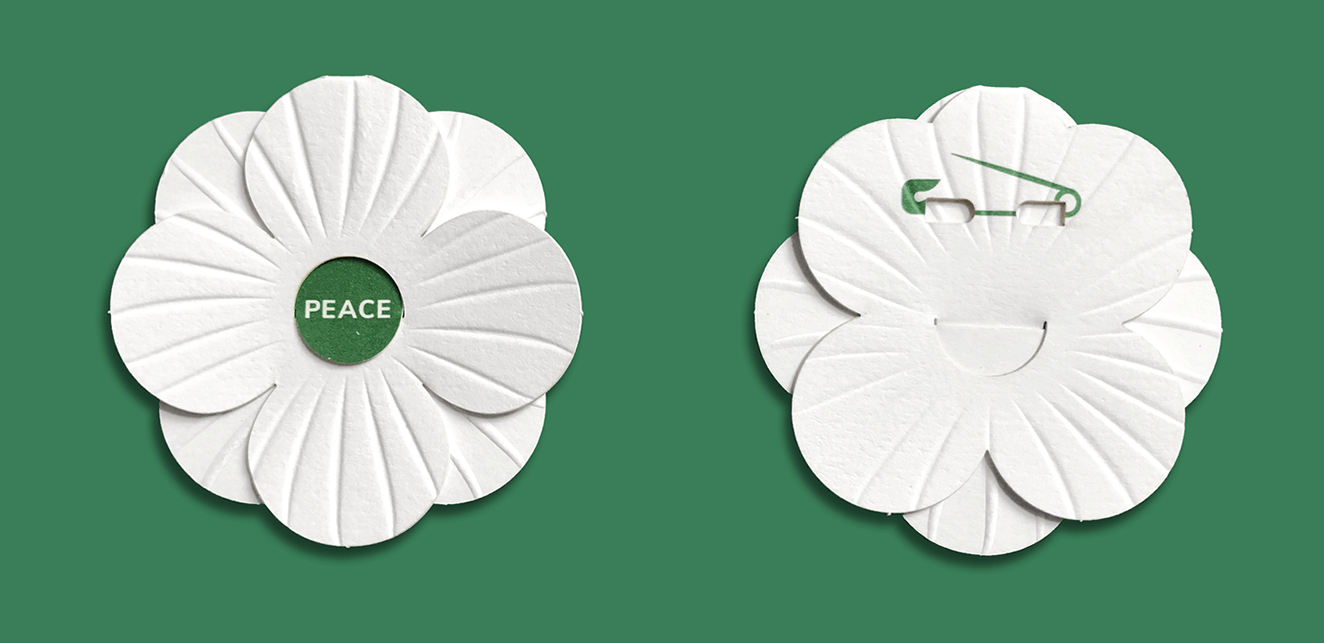Red poppies are now made from upcycled coffee cups and paper from responsibly managed forests
The new red poppy, which has been revamped for the first time in 28 years, will be made completely from paper, will no longer have a single-use plastic stem or centre, and can be recycled through ordinary household recycling collections. The Royal British Legion has been developing the plastic-free poppy for the last three years, in collaboration with expert partners, in efforts to reduce its use of single-use plastic and be less impactful to the environment.
The new design still features the traditional poppy shape and was created in collaboration with FSC-certified paper and packaging manufacturer, James Cropper (FSC®C009165). The bespoke paper is produced from a blend of renewable fibres. Upcycled fibre from paper coffee cup production, sourced via James Cropper’s CupCycling facility in Cumbria, make up half of the fibre in the product. The rest is sourced from responsibly managed, FSC-certified forests.
"Although we have worked with the Royal British Legion in the creation of poppies for remembrance for over 40 years, we never take for granted what this symbol means to so many families and the country as a whole. Everyone at James Cropper is very proud of our long-standing involvement in the production of the paper poppy, worn the world over as a mark of respect and remembrance."
- Steve Adams, Chief Executive Officer at James Cropper
The Royal British Legion has worked with scientists at University College London to assess the environmental impact of the new poppy and the findings revealed that the new poppy’s carbon footprint is 40% lower than the previous design. The Royal British Legion, which supports tens of thousands of armed forces personnel, veterans, and their families every year, hopes it will encourage more people than ever to support the Poppy Appeal, held in October and November each year, during the period of Remembrance.
The new poppy will be available alongside remaining stocks of the previous poppy design from Thursday 26 October until Remembrance Sunday on 12 November 2023. You can find out more about the plastic-free poppy here.
The poppies already in circulation that contain single-use plastic can be taken to Sainsbury’s stores for recycling after the Poppy Appeal.
White poppies went paper-based in 2022
White “peace” poppies, which are worn in the run-up to Remembrance Day as a symbol of remembrance and peace, went through their plastic-free redesign last year. The poppies were first produced in the aftermath of the First World War, to hold on to the key message of remembrance, ‘never again’. They are now distributed by the Peace Pledge Union, a pacifist campaigning organisation, promoting peaceful and non-violent solutions to conflict.
As the white poppy campaign has grown over time, the Peace Pledge Union became increasingly aware of the need to minimise their impact on the environment and ensure the poppies are ethically produced. Before the redesign, the white poppies were made from fabric with a wire stem and were not suitable for household recycling.

The new white poppy paper design was created by FSC-certified print and design co-operative Calverts (FSC®C007915). They were chosen because they specialise in design that is socially and environmentally responsible and frequently work with NGOs, charities, and campaigning groups.
“Co-operatives and the Peace movement have a long history of working together. This was a fantastic opportunity for our co-operative to work collaboratively with the Peace Pledge Union to transform this iconic emblem and make it more sustainable in the process. ”
-Arthur Stitt, Project Director, Calverts.
The new poppy maintains the look of the previous white poppy, with two layers of white petals and a circular green centre featuring the word ‘Peace’ but has been redesigned to be made from a single piece of FSC-certified paper. By using uncoated paper, printed with plant-based inks, the poppy is now entirely plastic-free, biodegradable and can easily be recycled in ordinary household recycling collections.
You can find out more about the white poppies on the Peace Pledge Union’s website here.

